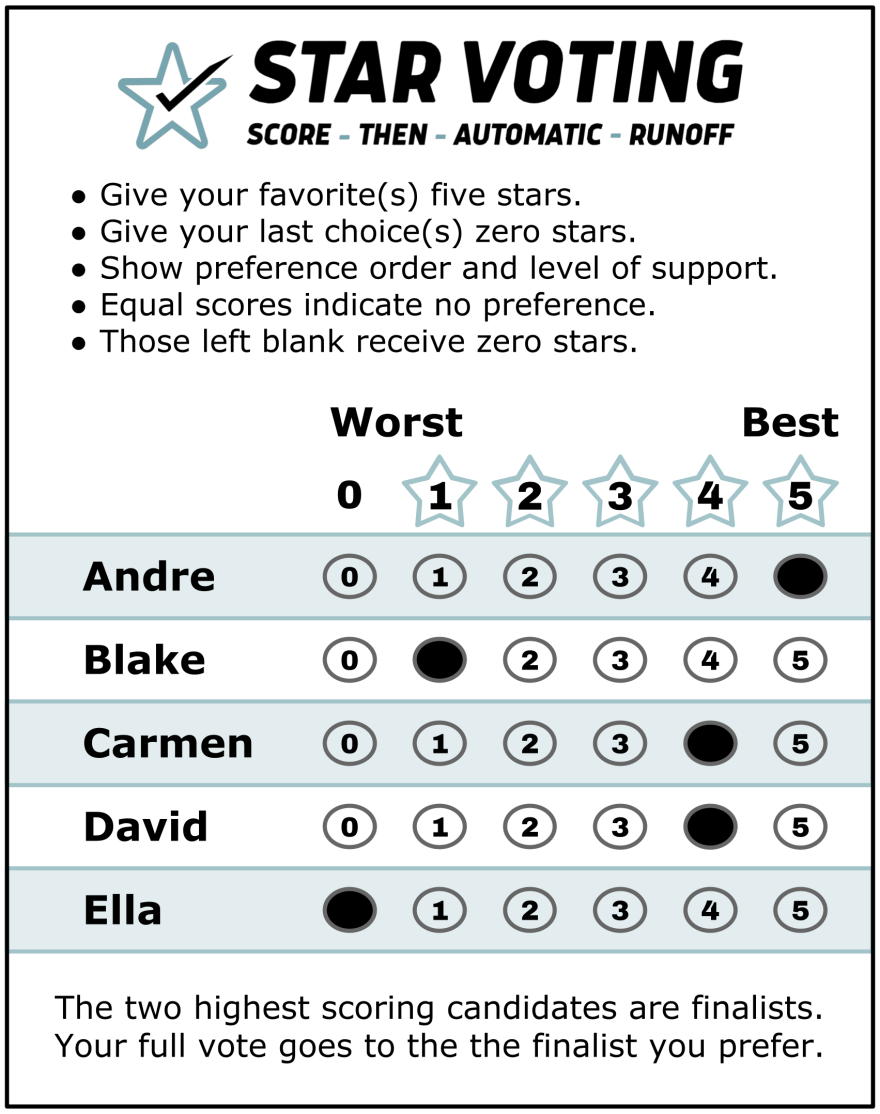This May, Eugene voters will decide whether to become the first city in the world to elect political candidates through a scorecard. The proposal is called STAR Voting, and it would apply to races for Mayor, City Council and EWEB, starting in 2026.
KLCC's Rachael McDonald spoke with KLCC reporter Nathan Wilk, who's been covering the proposal.
To start, can you give us an overview of how STAR Voting works?
Under this system, when Eugene voters receive a ballot, they would get to rate each candidate on a scale of zero to five stars. They could also give out ties.
The scores would be tallied up, and the two candidates who had the most stars would move on to a second round, or automatic runoff.
At that point, each ballot would be counted again, but this time like in a standard election—you’d have a single vote, and it would go to whichever finalist you’d scored higher originally.
But, if you’d given the same score to both finalists, you’d have shown no preference. And so your vote wouldn’t actually do anything in that second round.
I should note that this is different from Ranked Choice Voting. In that system, your vote sticks to one candidate until they are eliminated. In STAR Voting, you’re influencing multiple candidates at the same time.
Has STAR Voting ever been used before?
The Independent Party of Oregon tested it for its 2020 primary, and the state Democratic Party has used it to elect delegates.
But Eugene would be the first government to use it in the permanent way that’s being proposed here.
Why do supporters say it would be a good idea for Eugene?
I’ve spoken on several occasions with Sara Wolk, the founder of the Equal Vote Coalition, which leads this effort.
She says STAR Voting would reduce political polarization in office, by rewarding candidates who could draw stars from many sides.
But she also says it would allow the public to support who they truly want, by eliminating the fear of vote splitting.
“Our current system massively disenfranchises voters,” said Wolk, “by making it not safe to vote your conscience, by making it so that you need to vote for the front-runner on your side who seems electable.”
Wolk also positions this system as a competitor to Ranked Choice Voting. She claims STAR ballots would be more resistant to user error and tallying issues.
She’s also cited concerns about Ranked Choice’s state constitutionality, which of course advocates of that system dispute.

And what do those who oppose the STAR Voting measure say?
Last month, a coalition of voter advocacy groups actually came out against STAR Voting. That includes Next Up Oregon and Building Power for Communities of Color.
Brian Smith is the co-founder for the Tribal Democracy Project. He told me agrees that our current election system needs changes, but says there are many better options for reforms.
“STAR Voting is not something that makes the current system better,” said Smith. “It is a regression. It takes us backwards.”
Smith is concerned about voter strategy—basically, can someone manipulate their ballot to be more effective?
The League of Women Voters of Oregon says under this system, people could use polling data to guide their votes. This could mean withholding stars or trying to boost a weaker candidate to the second round.
The League also says if you give out any stars beyond your first-place candidate, you hurt your favorite’s chances.
Smith says this is concerning for voters who’ve been historically disenfranchised, because they might not have the resources to learn how to game the system.
He’s also worried that progressives in general might rate their candidates lower, and he says the system is just untested.
“Native tribal communities or communities of color—we're not a petri dish,” said Smith. “We're not an experiment.”
When STAR Voting has been used in the past, have these issues come up?
I want to focus on a specific example and tell you about the Independent Party’s primary for Oregon Secretary of State.
There were three Democrats in that race, but a segment of left-leaning voters only gave stars to the Dem they preferred most.
Ultimately, none of the three Dems made the second round, despite having more first-choice supporters between them than the centrist Independent who did advance.
And when it came down to an Independent versus a Republican in that runoff, over a quarter of voters had given the same scores to both candidates, so their ballots basically didn’t do anything.
The Republican won, but an analysis from STAR Voting found that the results could have swung if just a few of the left-leaning voters had shown more thorough preferences.
To Brian Smith, this shows clear disenfranchisement in STAR Voting. He says the system punished voters and advocates blamed it on their poor strategy.
But to Sara Wolk, this shows that trying to game this system by withholding stars doesn’t actually work.
“If you do have a more nuanced opinion in STAR Voting, you should show your preferences,” said Wolk. “And that way, whether or not your favorite can win, your vote will help prevent your worst case scenario.”
Wolk believes honesty and following the ballot instructions would be the best strategy.
Additionally, I spoke to Sal Peralta with the Independent Party of Oregon. He says these primary results are consistent with the political alignments of the voters who participated, and the party is open to using STAR Voting again in the future.
What happens next?
If this Eugene ballot measure passes in May, Wolk says volunteers will commit fully to voter education efforts, to overcome that learning curve, before [the system] takes effect in 2026.
And this also all comes in the context of November, when Ranked Choice Voting is going to be on the ballot for Oregon’s state and federal elections.





